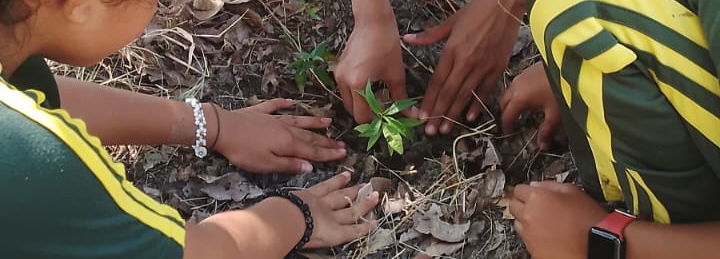Green Economy-oriented Manpower Training Business
Green economy-oriented training is an economic activity that bot only focuses on improving work skills but also prioritizes environmental sustainability, community empowerment, and shared prosperity.
LPTM serves as a manpower training enterprise, particularly in the field of heavy equipment operation, with the aim of producig certified workers who are ready to enter the workforce. Out of its four training locations, one site in Gowa Regency has been developed with a green economy concept through the implementation of three main frameworks: environmental awarness, community involvement, and the creation economics benefits and welfare.
In terms of environmental aspects, the Gowa training site has been designed with the planting of 5.000 Bitti trees (Vitex Cofassus), 1.000 bamboo trees, and 500 Aren Genjah trees. These function as barriers against dust, noise, and vibrations, while also serving as raw material for organic fertilizer. Plastic reduction practices are also implemented through reuse, for example, participants’ used plastic cups are repurposed as seedling containers and reduce by minimizing the use of single-use plastics at the training site.
Organic waste is separated and composted, while rainwater is managed through infiltration wells and biopore holes. Beyond infrastructure, green economy principles are integrated into the training curriculum, ensuring that participants gain not only technical skills but also sustainable environmental awareness. In addition, solar power installation training has been introduced, along with the initiation of daytime solar energy use to support electricity needs at the training site.
From the perspective of community empowerment, LPTM provides opportunities for local residents to become partners by offering rental rooms for training participants, food stalls, and other supporting services. LPTM also initiated the establishment of the Kelompok Tani HUtan (KTH) “Pakoko Assamaturu” in Pabbentengang Village, Bajeng District, Gowa Regency, with 39 members led by Bapak Haeruddin.
Officially registered under Number 73/06/02/2007/KTH.288/2025 on June 10, 2025, the group has received support from the Je’neberang Forest Management Unit (KPH) in the form of seedlings of Red Jabon, Grafted Avocado, Musangking Durian, and Nutmeg. The establishment of KTH provides a platform for the community to manage community forests, support reforestation, and sustainably utilize forest resources.
The benefits of this green economy-based training program extend beyond the participants to the surrounding community. Trainees acquire technical skills that equip them to enter the workforce and earn income.
LPTM also creates new job opportunities, both for trainers and internal staff. Meanwhile, local communities benefit economically through business opportunities such as accommodation and catering services. Business owners gain space to expand their enterprises within a more competitive and sustainable ecosystem.
In addition to training, LPTM offers green economy advisory services to provincial and district governments seeking to develop green economy-based areas, whether in regional zones, industrial estates, or housing developments.
Looking ahead, LPTM plans to expand its training programs with courses on Green Economy Awareness and Sustainable Development, targeting civil servants, private sector workers, job seekers, and the general public. As the future of development demands a skilled workforce that understands green economy principles, this training is expected to serve as a vital foundation for advancing a more sustainable, environmentally friendly, and prosperous era of development.
